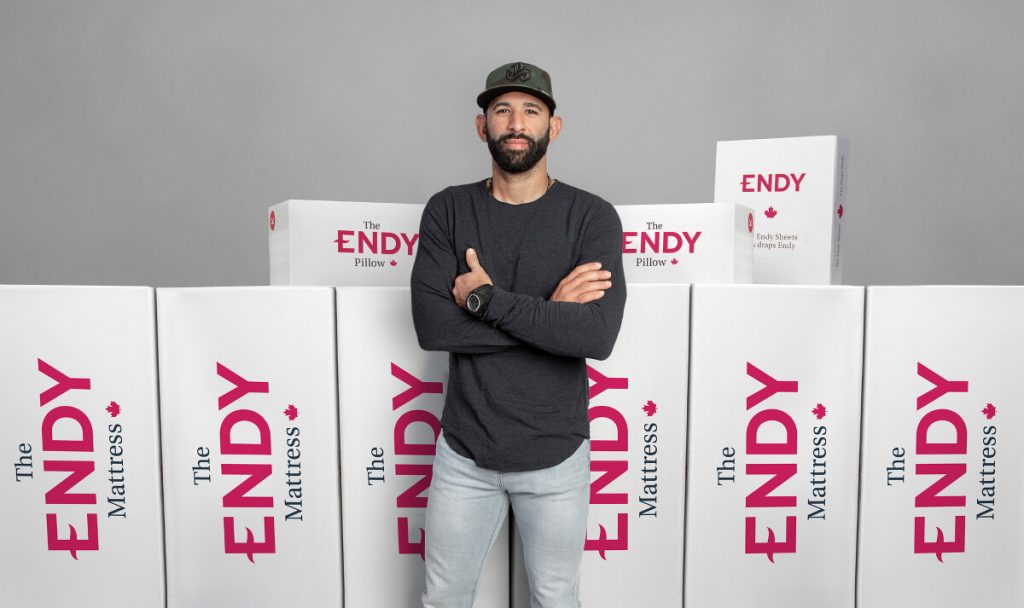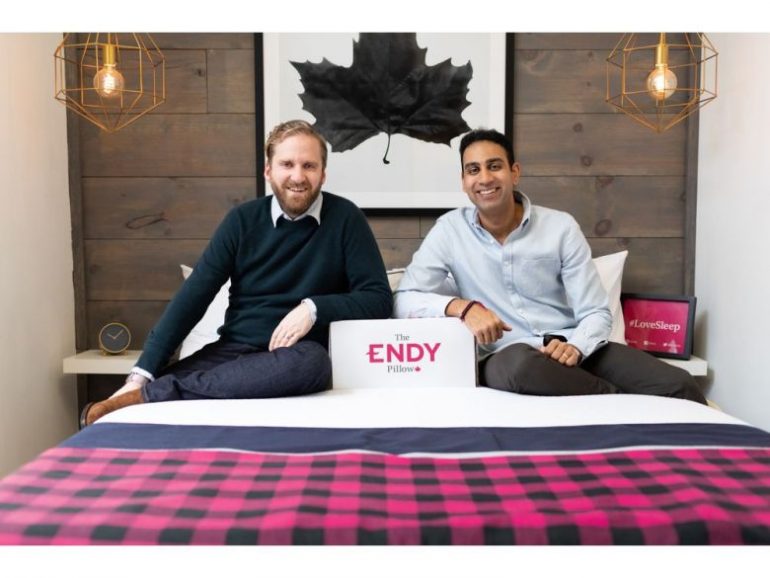Last month, Toronto-based mattress company Endy was acquired by Sleep Country Canada for $89 million. BetaKit recently sat down with Rajen Ruparell, co-founder and chairman of Endy, and Mike Gettis, co-founder and CEO of Endy, to discuss why they decided to sell the company.
Launched in 2015, Endy is known for its eponymous mattress that ships in a box the size of a hockey bag. The company – which only services Canada – has since released the Endy Pillow, Endy Sheets, and the Endy Mattress Protector. In August 2018, the company received an undisclosed minority investment from Blue Jays slugger José Bautista.
“We will continue making our mattress in Canada. That’s a really important part of our DNA.”
Ruparell said that while Endy received a lot of interest in terms of acquisitions and VC investment, the company was initially not actively seeking an acquisition, as it wanted to remain in the Canadian market. But when Sleep Country approached Endy, the company’s focus on growth combined with a mission to remain in Canada perfectly aligned with Endy’s goals.
“Our mission of being Canadian was important. Being independent was very, very important to us,” Ruparell said. “Sleep Country came along and said you get to remain in Canada. So we will continue making our mattress in Canada. That’s a really important part of our DNA and we get to grow and be with a growth company…We get to continue our mission and most importantly, we get to stay separate.”
Going forward, Sleep Country and Endy will be run separately, with general oversight of the Endy business provided by a board comprised of the senior management of Sleep Country and Endy. Ruparell will chair the board.
“The key factor in the acquisition was being able to continue to grow a brand full-Canadian,” said Ruparell. “Sleep Country being an iconic Canadian brand serving Canadians that has achieved a lot of what we still have not achieved, given their history and depth and ability to stay constant as a growth company, that was a major factor in our acquisition.”

Ruparell said that while Endy has enjoyed good success to date, there’s still a long way to go to become a household name. The company also faces strong competition from US-based Casper, which has its own retail relationships with EQ3, Indigo and Hudson’s Bay, as well as a standalone store. As a company that is striving to build a “patriotic Canadian brand,” Gettis and Ruparell stated an intention to double-down on every Canadian province, with the goal of creating a “true ecommerce brand” for Canadians.
“I chose to move back to Canada and build this with Mike so we could really give Canadians a choice for a product built for Canadians by Canadians and shipped in Canada to Canadians,” said Ruparell. “We wanted to build a company that thought Canada-first for ecommerce.”
While the acquisition of Endy is expected to help Sleep Country boost its ecommerce offering and brick-and-mortar stores (Sleep Country currently has 264 stores across Canada), Ruparell said that in the foreseeable future, Sleep Country and Endy will continue to remain separate brands, and he did not expect the companies to work together actively on a day-to-day basis.
“The spirit of the deal was the fact that we have a lot of respect for their heritage and the stuff [Sleep Country Canada] has built, but they have a lot of respect and understanding that we are experts in our field, which is building an ecommerce brand,” said Ruparell. “That is very different than the Sleep Country brand. So what made this easy for both of us was the neutral aspect and the ability to allow us to continue on our own path without the interference of the other. I think there’s an opportunity to lean on each other with learning but that will come over time.”
When asked how Sleep Country will help Endy, Ruparell said that in the foreseeable future, Sleep Country and Endy will continue to remain separate brands and he does not expect the companies to work together actively on a day-to-day basis.
That said, Endy is currently planning out its 2019 operations, but Ruparell noted the company’s intention to expand into the brick-and-mortar retail space.
“We want to look at brick-and-mortar in the Endy way. We want to make an experience that fits with our customer experience that we’ve done online. It’s something that customers really enjoy,” said Gettis.
Ruparell said that in the foreseeable future he did not expect the Endy and Sleep Country to work together actively on a day-to-day basis.
Being able to continue controlling the company in a way that reflects Endy’s mission was key for Gettis and Ruparell. “We wanted to do something special, build a high growth company,” said Ruparell. “We wanted to retain control the same way we have the ability to continue growing a brand in a way that we believe is best for the customer and the consumer. We just wanted to make sure that our board meetings consist of Mike and I making decisions together, and that was probably the reason we were able to grow so fast.”
The twin desires for control and growth also led Endy from other acquisition offers or VC investment. Gettis told BetaKit that investors and other companies who approached Endy did not meet their criteria for an ideal partner.
“We definitely looked at quite a few term sheets,” he said. “The term sheets tend to have a lot of terms in them that don’t necessarily help the entrepreneurs in the business. It’s very positive towards the VC firms that they get a lot of power over your daily operations. We wanted to run it our way and be able to grow in a way that we needed to.”
With files from Jessica Galang.


